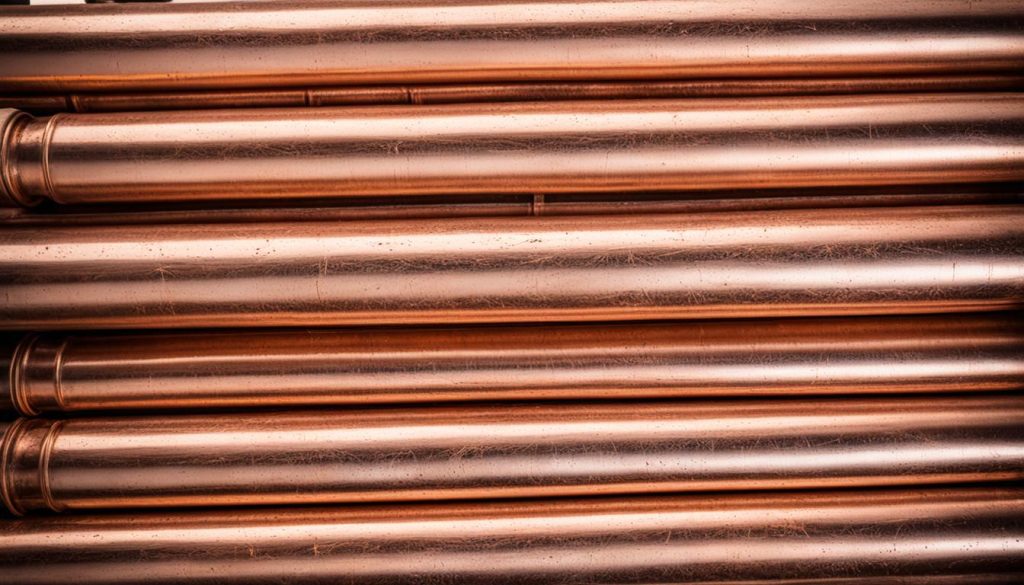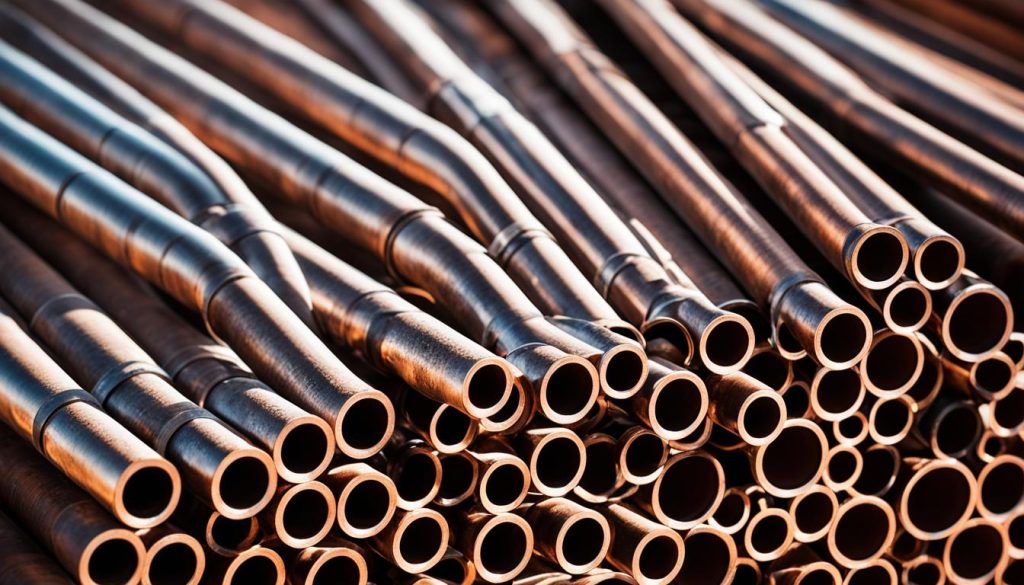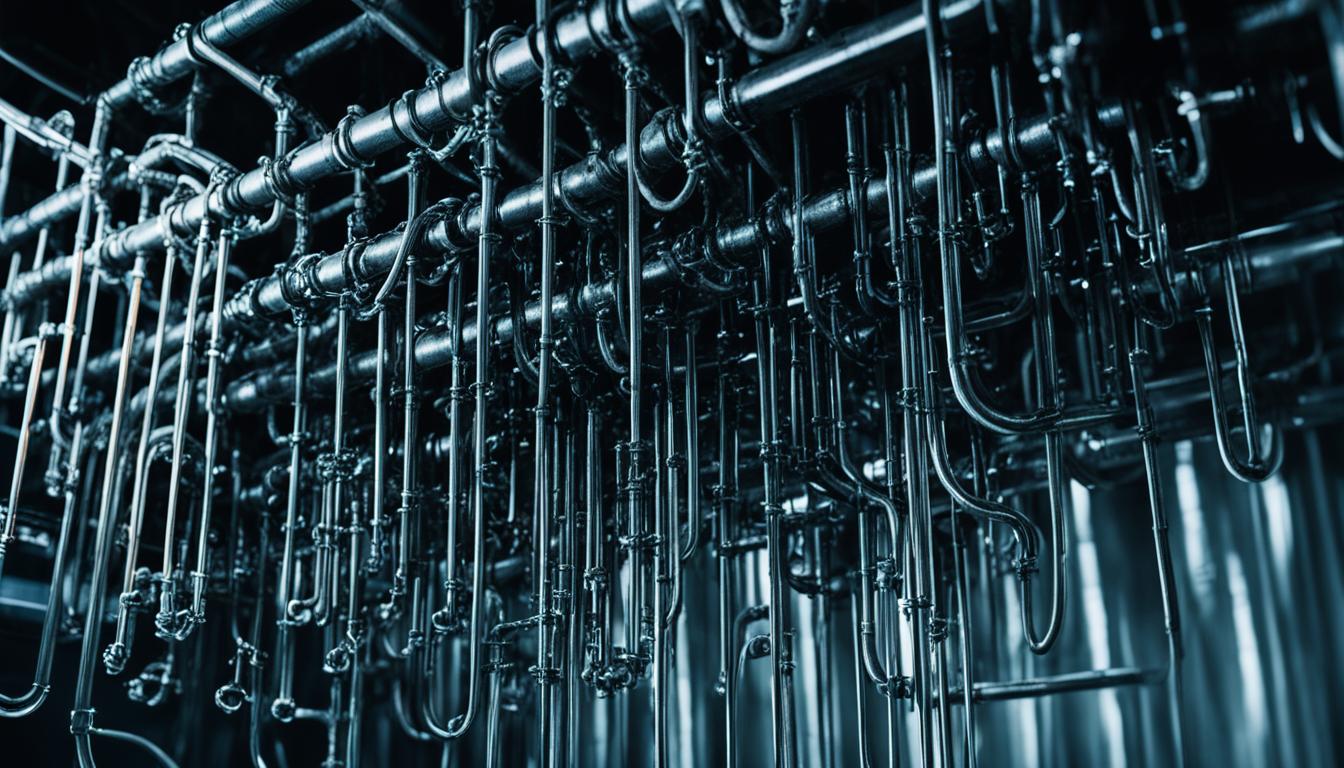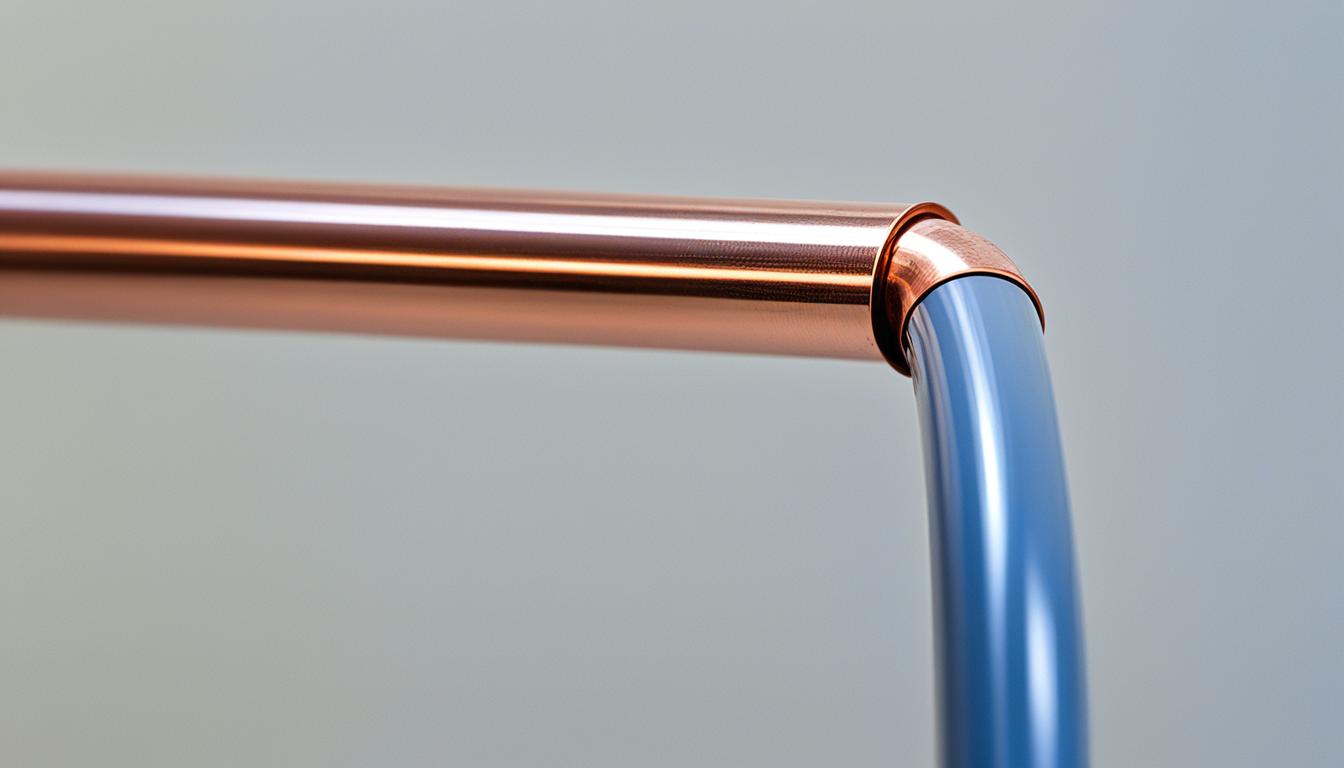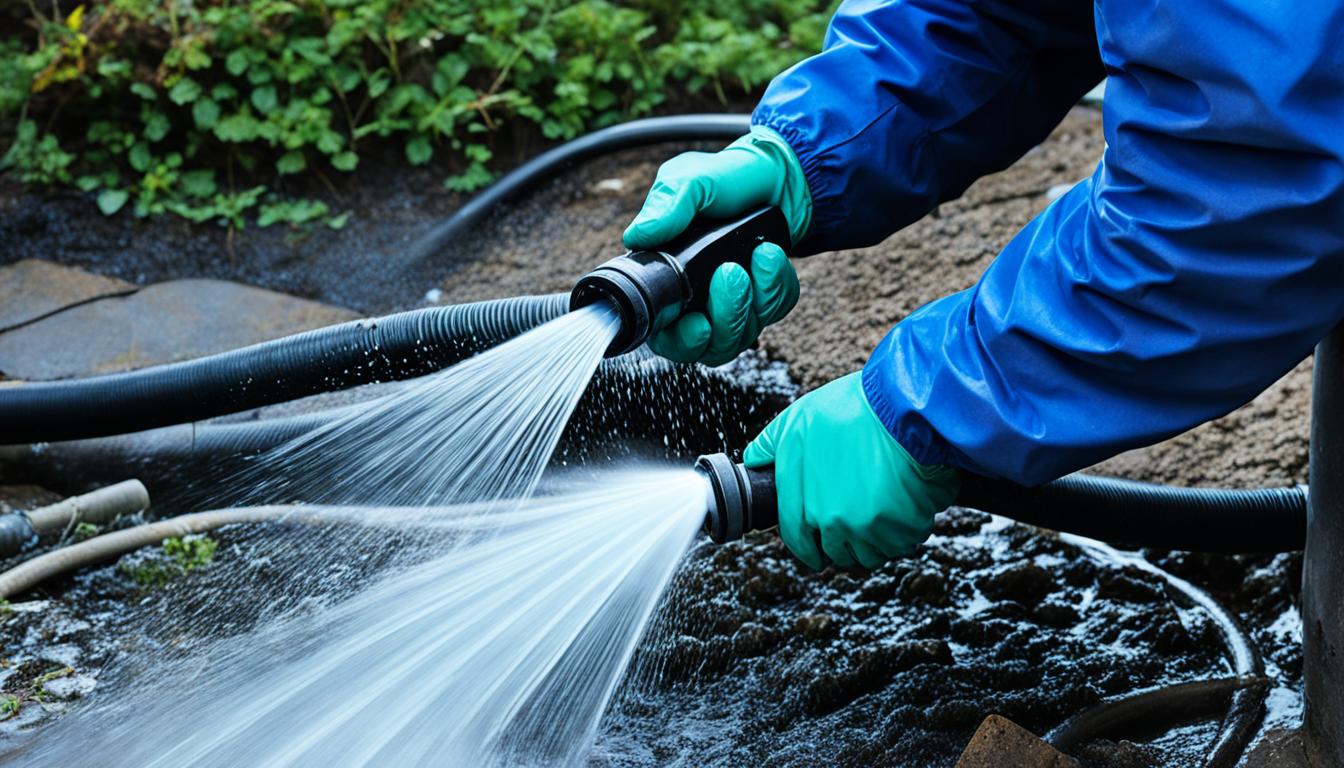Copper Pipes for Water: Reliable Plumbing Choice
Did you know that copper pipes have been the go-to choice in the plumbing industry for decades? It’s true! These durable and reliable pipes are commonly used for water supply and drainage systems due to their numerous benefits and long lifespan.
Key Takeaways:
- Copper pipes are a popular choice for plumbing systems due to their durability and reliability.
- They offer several advantages including resistance to corrosion and longevity.
- Copper pipes are suitable for water supply, drainage, and sewage systems.
- It’s important to follow proper installation techniques to ensure optimal performance.
- Regular maintenance and inspections can help prevent potential corrosion issues.
Benefits of Using Copper Plumbing Pipes
When it comes to plumbing, choosing the right pipes is crucial for ensuring a reliable and long-lasting system. Copper plumbing pipes have gained popularity for their numerous benefits over the years, making them a preferred choice for homeowners and professional plumbers alike.
One of the key advantages of copper plumbing pipes is their exceptional durability. These pipes can withstand high pressure without any risk of bursting or leaking, providing peace of mind to homeowners.
Unlike plastic pipes, copper pipes have an impressive lifespan, typically lasting between 50 to 70 years. This longevity is a testament to their superior quality and ability to withstand wear and tear over time.
Copper pipes are also highly resistant to corrosion, which is a common issue with other types of pipes. This corrosion resistance ensures that your water remains clean and uncontaminated, promoting better health and safety for you and your family.
The lightweight nature of copper pipes makes them easy to handle and install, reducing the labor and time required for the plumbing project. Additionally, the manufacturing process of copper pipes is environmentally friendly, aligning with sustainable practices.
| Benefits of Copper Plumbing Pipes |
|---|
| Durability |
| Lifespan of 50-70 years |
| Resistance to corrosion |
| Clean and uncontaminated water |
| Lightweight and easy to install |
| Environmentally friendly manufacturing process |
Considering these benefits, it’s no surprise that copper plumbing pipes are a popular choice for residential and commercial plumbing projects. Their exceptional durability, resistance to corrosion, and clean water delivery make them an investment well worth considering.
Drawbacks of Using Copper Piping
While copper pipes have many benefits, it’s important to consider the drawbacks before making a decision for your plumbing system. Here are some key points to keep in mind:
1. Higher Cost
Copper piping is generally more expensive than plastic piping options. The initial investment for copper pipes may be higher, which can affect overall project costs.
2. Metallic Taste
In some cases, copper pipes can add a metallic taste to the water, especially if the pipes begin to corrode. This can affect the overall drinking and cooking experience for homeowners.
3. Unsuitable for Acidic Water
Copper pipes are not recommended for areas with acidic water or well water with high acidity levels. Acidic water can corrode copper pipes over time, leading to leaks and potential damage to the plumbing system.
To prevent the issues caused by copper pipe corrosion, proactive measures should be taken. By implementing proper preventive techniques, homeowners can ensure the longevity and performance of their copper plumbing system.
Copper vs Plastic Water Pipes: A Comparison
When it comes to choosing between copper and plastic water pipes, there are a few factors to consider. Copper pipes are known for their durability and resistance to corrosion, making them a reliable choice for plumbing systems. On the other hand, plastic pipes, such as PEX (cross-linked polyethylene), offer affordability and easy installation. Let’s take a closer look at the key differences between these two options:
Durability and Resistance
Copper pipes are renowned for their strength and longevity. They can withstand extreme temperatures, high pressure, and have a life expectancy of 50-70 years. The inherent corrosion resistance of copper ensures the pipes maintain their integrity over time, reducing the risk of leaks and costly repairs. Plastic pipes, while durable, may not have the same level of resilience as copper in demanding conditions.
Cost and Installation
Plastic pipes, especially PEX, are generally more cost-effective compared to copper pipes. The material costs less, and the installation process is simpler, requiring fewer fittings and connections. Plastic pipes are flexible, making them easier to maneuver and install in tight spaces. Copper pipes, on the other hand, may have higher upfront costs due to the price of the material and the skills required for installation.
Quality of Water
Copper pipes have a proven track record for delivering clean, safe drinking water. Copper is a natural antimicrobial material, inhibiting the growth of bacteria and algae inside the pipes. As a result, copper plumbing systems can provide high-quality water without contaminants or odors. Plastic pipes, while generally safe, may have the potential to leach chemicals into the water, especially in cases where the pipes are exposed to high temperatures or sunlight.
Eco-Friendliness
Copper pipes are a sustainable choice due to their recyclability and long lifespan. Copper can be recycled indefinitely without losing its properties, reducing the impact on the environment. Plastic pipes, while recyclable to some extent, may not have the same longevity or recyclability as copper.
| Copper Pipes | Plastic Pipes (PEX) | |
|---|---|---|
| Durability | Durable and resistant to corrosion | Durable, but may not have the same level of resilience as copper |
| Cost | Higher upfront costs | Lower material and installation costs |
| Water Quality | Delivers clean, safe drinking water | Potential for chemical leaching |
| Eco-Friendliness | Recyclable and sustainable | Less recyclable and may have a shorter lifespan |
Ultimately, the choice between copper and plastic water pipes depends on your specific needs, budget, and preferences. If durability, resistance to corrosion, and water quality are your top priorities, copper pipes are an excellent option. If affordability and easy installation are more important, plastic pipes like PEX can be a suitable alternative.
It’s advisable to consult with a professional plumber to evaluate your plumbing requirements and determine the best type of water pipe for your home or project.
Copper Pipe Fittings and Installation Tips
Proper installation is crucial for the performance and longevity of copper pipes. To ensure a secure connection, it’s essential to use the right copper pipe fittings. These fittings are widely available and come in various sizes and types to accommodate different plumbing needs.
Here are some essential tips for installing copper pipes:
Cleaning and Deburring
Prior to installation, it’s important to thoroughly clean the ends of the copper pipes with emery cloth or a wire brush. This helps remove any debris or oxidation that could hinder proper soldering. Additionally, make sure to deburr the edges of the pipes using a deburring tool or a reaming tool to create smooth and even surfaces for soldering.
Using the Right Tools
Having the appropriate tools for copper pipe installation is crucial. Some essential tools include a pipe cutter, a reaming or deburring tool, a pipe wrench, a propane torch, flux, and solder. Using high-quality tools ensures precise cuts and proper soldering, resulting in a leak-free and durable connection.
Soldering the Joints Correctly
Soldering is the process of joining copper pipe fittings together. It’s important to follow the correct soldering technique to ensure a strong and watertight connection. Before soldering, apply flux to the cleaned and deburred surfaces of the pipes and fittings. Heat the joint evenly using a propane torch, and once the surfaces reach the correct temperature, apply solder to the joint. The solder should melt and flow smoothly into the joint, creating a solid bond.
In conclusion, proper installation techniques, including cleaning, deburring, using the right tools, and correct soldering, are essential for a successful copper pipe installation. Hiring a professional plumber with experience in working with copper pipes is highly recommended to ensure the installation is done correctly and efficiently.
| Tools Needed | Usage |
|---|---|
| Pipe cutter | To make precise cuts on copper pipes |
| Deburring tool or reaming tool | To remove sharp edges and create smooth surfaces for soldering |
| Pipe wrench | To hold and stabilize pipes during installation |
| Propane torch | To heat the joint for soldering |
| Flux and solder | To facilitate the soldering process and create a strong bond |
Copper Pipe Corrosion Prevention
Although copper pipes are generally resistant to corrosion, it is still crucial to take preventive measures to ensure their longevity and performance. By implementing a few key practices, you can effectively prevent corrosion in your copper plumbing system.
1. Water Treatment Systems
Installing a water treatment system can help balance the acidity of the water and prevent corrosion in copper pipes. These systems can neutralize any acidic properties, ensuring the water flowing through the pipes is less corrosive. Consult with a professional plumber to determine the most suitable water treatment system for your plumbing needs.
2. Regular Maintenance
Maintaining your copper pipes is essential to prevent corrosion. Regularly inspect the pipes for any signs of damage, such as discoloration, pitting, or leaks. Address any issues promptly to prevent further corrosion and ensure the proper functioning of your plumbing system. Consult with a professional plumber if you notice any abnormalities or if you are unsure how to maintain your copper pipes.
3. Corrosion-Resistant Coatings
Applying a corrosion-resistant coating to the surface of copper pipes can provide an extra layer of protection against corrosion. These coatings act as a barrier, preventing contact between the copper and any corrosive substances, prolonging the life of the pipes. Consult with a professional plumber to determine the appropriate coating for your copper pipes.
4. Avoid Harsh Chemicals
When cleaning your plumbing system, avoid using harsh chemicals that can accelerate the corrosion process in copper pipes. Opt for gentler cleaning solutions that are specifically formulated for copper pipes. Consult with a professional plumber for recommended cleaning products.
5. Proper Insulation
In colder climates, it’s essential to properly insulate copper pipes to prevent freezing and potential corrosion. Insulating the pipes can help maintain a consistent temperature and reduce the risk of any water condensation, which can lead to corrosion. Consult with a professional plumber for guidance on proper insulation techniques.
| Preventive Measures | Effectiveness |
|---|---|
| Water Treatment Systems | Highly Effective |
| Regular Maintenance | Effective |
| Corrosion-Resistant Coatings | Effective |
| Avoid Harsh Chemicals | Moderately Effective |
| Proper Insulation | Highly Effective |
Uses of Copper Pipes in Plumbing
When it comes to plumbing, copper pipes are an essential component due to their versatile applications. Whether it’s the water supply lines, drainage systems, or sewage lines, copper pipes offer durability and reliability, making them a top choice for plumbers.
One of the primary uses of copper pipes in plumbing is for water supply lines, both hot and cold. The superior strength and resistance to corrosion of copper make it ideal for carrying water to faucets, showers, and other fixtures throughout the home. With copper pipes, you can rest assured of a long-lasting and leak-free water supply system.
In addition to water supply lines, copper pipes are also suitable for drainage systems. They efficiently transport wastewater away from sinks, toilets, and showers, ensuring proper sanitation and preventing clogs and backups. The smooth interior surface of copper pipes helps prevent the accumulation of debris and aids in the efficient flow of wastewater.
Copper pipes are also commonly used for sewage lines. Their durability and resistance to corrosion make them a reliable choice for transporting sewage safely away from the home. Whether it’s a residential or commercial property, copper pipes provide the strength and performance necessary for efficient sewage removal.
Overall, the versatility of copper pipes in plumbing applications is unmatched. From water supply lines to drainage systems and sewage lines, copper pipes deliver exceptional performance and longevity. Their ability to withstand high pressure, resist corrosion, and maintain the quality of water make them a preferred choice for plumbing professionals.
Tips for Choosing Copper Pipes for Your Home
When it comes to choosing copper pipes for your home’s plumbing system, there are several important factors to consider. These tips will help ensure that you select the right copper pipes for your specific needs:
1. Size Matters: The size of the pipes is crucial for proper water flow and pressure. Consult with a professional plumber to determine the appropriate pipe size based on your household’s water demands and the layout of your plumbing system.
2. Type of Copper: There are three main types of copper pipes: Type K, Type L, and Type M. Each type has different thicknesses, with Type K being the thickest and most durable. Consider the specific requirements of your plumbing system and consult with a plumber to determine the best type of copper pipe for your needs.
3. Professional Installation: Copper pipes require skillful installation to ensure their optimal performance and longevity. Hiring a professional plumber with experience in working with copper pipes is highly recommended. They will have the necessary knowledge and expertise to properly install the pipes, making sure all connections are secure and leak-free.
4. Maintenance and Inspections: Regular maintenance and inspections are essential for keeping your copper plumbing system in top condition. Periodically check for any signs of corrosion, such as discoloration or leaks, and address them promptly. Flushing the pipes annually and installing a water treatment system can help prevent corrosion and extend the lifespan of your copper pipes.
Source Links
- https://www.ewg.org/healthyhomeguide/plumbing-and-pipes/
- https://www.wmhendersoninc.com/blog/plumbing-tip-pros-and-cons-of-copper-piping/
- https://www.monkeywrenchplumbers.com/learning-center/pros-cons-copper-pipe
- Investing Wisely: How Windows & Doors in Boost Property Value and Financial Health - April 24, 2025
- The Financial Impact of Personal Injuries: Why Legal Help Matters for Business Owners - April 16, 2025
- The Hidden Financial Costs of Domestic Assault: What Business Owners Need to Know - April 16, 2025
